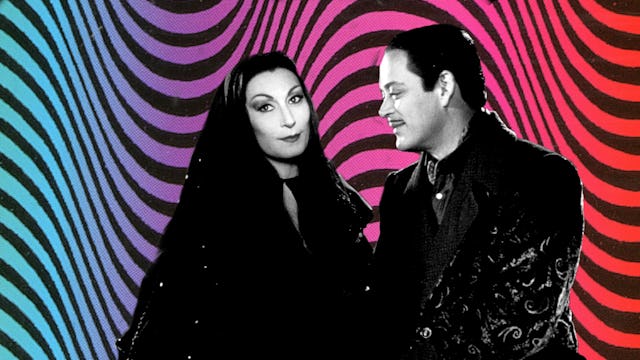Pop culture dads in the 90s were mostly disappointing buffoons. But the Addams family patriarch was the model of non-toxic masculinity.


Gomez Addams was a king. Why can't all men be like him?
Millennials who were born in the 1980s and weaned on the pop culture of the 1990s were nurtured by unflattering small-screen father figures. There were the doofuses: Home Improvement’s Tim “The Toolman” Taylor, Dinosaurs’ Earl Sinclair, and the king of all doofus dads, Homer Simpson. There were the professional dads: Family Matters’ Carl Winslow and The Fresh Prince of Bel Air’s Philip Banks had their faults and foibles, but if you found yourself in a jam — a bank robbery, a pool hall hustle — they’d be there to pull you out of it. Rugrats’ Stu Pickles had a habit of making absent-minded trouble for his family, but he had an equal knack for saving the day. What we saw in these men, we looked for in our own fathers; we scrutinized them, wondering if our dads were a Taylor, a Pickles, or a Winslow, or a hodgepodge of each.
It’s probable none of us included Gomez Addams in our paternal calculus., The Addams Family, based on the work of cartoonist Charles Addams and the 1964 TV series, burst into millennial consciousness on November 22, 1991, with a forbidding PG-13 rating. Portrayed by Raul Julia with a pencil-thin mustache, Gomez Addams had little in common with 90s dads. A protagonist in popular culture who waves a supernatural goth flag with flagrant pride, he was not the type of character moms and dads wanted their kids to associate with. He was a scoundrel lording over a haunted mansion, the patriarch of a family of antisocial misfits garbed in black and raised on the macabre.
This is the short view of Gomez. In the long view, he’s not merely an ideal 1990s masculine role model, but the ideal 1990s masculine role model. He’s the mirror who shows other fathers and other men that they’re acting like clowns. No man is as devoted to their spouses nor as determinedly committed to their families as he is, and no man is as comfortable in his skin or as liberated by his masculinity. Gomez was free. Societal expectations saddled on men in the 90s didn’t suit him: he wasn’t distant or emotionally unavailable; he didn’t favor workaholism at the expense of his stone-cold fox of a wife, Morticia, or their children, Wednesday and Pugsley. Sure he was sometimes a nuisance to his unfortunate neighbor, but it isn’t his fault uptight Judge Womack lives in the range of his formidable golf swing. What else was Gomez supposed to do? Not practice his drive?
No man is as devoted to their spouses nor as determinedly committed to their families as Gomez Addams.
Viewed through the lens of 1990s Christian conservatism, which embraced stereotypical gender roles, Gomez was a countercultural freak. These were the people whose elected representatives tried to shut down art exhibitions on account of blasphemy. Gomez is the kind of guy who would probably go to a gallery to gaze at photographs by Robbert Mapelthorpe or Andreas Serrano in admiration. Viewed through a liberal lens, though, Gomez was and remains remarkably progressive. He rejected social mores and went further than that by creating his own; he is a roguish rascal who, having been born a baby and finding that he quite liked it, chose to never fully grow up.
For Gomez, it would be weird not to lust after his wife Morticia in plain view. “I would die for her,” he sighs, gazing at Morticia in her morning repose. “I would kill for her. Either way, what bliss.” Most men would respond to their wives’ objections to dawn’s harsh glare by simply shutting the blinds. Gomez grabs the nearest rapier and in one swashbuckling display, strikes them closed as if fending off intruders in their home. It’s theatrical. It’s over the top. It’s hot. (“You were unhinged. You were like some desperate, howling demon. You frightened me. Do it again,” whispers Morticia the next day.) Gomez is macho in his unabashed bravado but tender in his purpose: It’s healthy to be horny for your significant other, and there’s nothing wrong about desiring your partner. In fact, it’s the most romantic thing in the world.
The Addams Family sends us a messenger who’s anything but “normal” to teach this otherwise normal lesson. In the film’s 1993 sequel, Addams Family Values, Wednesday takes her father’s model to heart when she meets her first love, Joel, as they revel in their mutual distaste for standards of normalcy down to the sweet nothings whispered in romance languages. Gomez doesn’t say whether he’s prouder of the latter or the former; given the chaos the pair sow at summer camp, torching buildings and revolting against their counselors and fellow campers alike, it’s easy to guess. Every dad should hope to take that much delight in their children’s growth. If that’s their goal, then Gomez is the man to emulate.